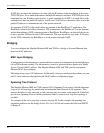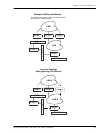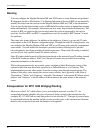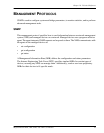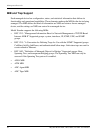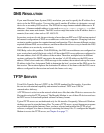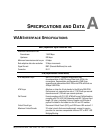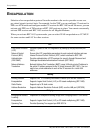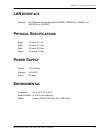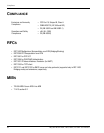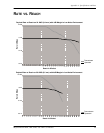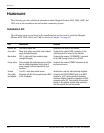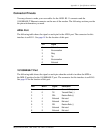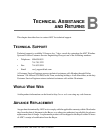
Encapsulation
96 Megabit Modem 400F, 500L, 600F, and 700F User Manual
ENCAPSULATION
Selection of an encapsulation protocol from the modem to the service provider occurs on a
per virtual circuit (session) basis. For example, for the 700F you can configure 32 sessions for
PPP over ATM mode and configure another 32 sessions for RFC 1483 mode. However, you can
activate only PPP over ATM sessions or RFC 1483 sessions at a time. You cannot concurrently
activate PPP sessions and RFC 1483 sessions for all Megabit Modems.
When you activate RFC 1483 system mode, you can select WAN encapsulation as VC-MUX
for some sessions and LLC for other sessions.
PPP
Link Control Protocol
(LCP)
Provides a phase of the PPP negotiation by setting up the physical link (RFC
1661).
Network Control
Protocol (NCP)
Occurs after LCP, negotiating parameters for each network interface and uses
Internet Protocol Control Protocol (IPCP) which is defined in RFC 1332.
Authentication
(PAP/CHAP)
Provides authentication of PPP sessions for security through Password and
Challenge-Handshake Authentication Protocols (RFC 1994).
Network Address
Translation
Network Address Port Translation (NAPT) maps LAN side private IP address to
the public IP address assigned to the 32 virtual channels (RFC 1631). You can
map to two private addresses to each of the 32 sessions for a total of 64
addresses.
Routing
Routing Protocol Supports RFC 1724 Routing Information Protocol (RIP and RIP Version 2).
Encapsulation Supports Logical Link Control (LLC) or VC-based multiplexing (RFC 1483).
Static Routes Supports up to 32 static routes
Address Resolution Supports Address Resolution Protocol (ARP) over the LAN port (RFC 826)
Bridging
Bridging and Address
Learning
Implements a transparent learning bridge with a bridging table of 1024 entries.
Encapsulation Supports Logical Link Control (LLC) or VC-based multiplexing (RFC 1483).
Spanning Tree Provides Spanning Tree support per IEEE 802.1d.



